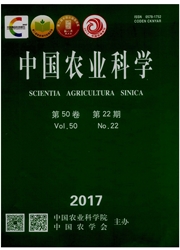

 中文摘要:
中文摘要:
【目的】定量研究淮河流域小麦-水稻种植制度对气候变化的响应,揭示种植制度适宜性的变化规律,明确种植制度适宜区的变动趋势,为因地制宜地制定科学可靠的种植制度提供依据。【方法】运用生态适宜度理论和模糊数学的方法,建立作物适宜度函数,同时结合空间插值的方法研究淮河流域麦-稻制的温度、降水、日照和气候适宜度。【结果】小麦-水稻种植制度的气候适宜度呈下降趋势;其中,温度适宜度呈上升趋势,降水适宜度和日照适宜度呈递减趋势。淮河流域麦-稻制气候适宜度的空间分布由东南沿海向西部山地递减,西南山区适宜度低于平原地区。在未来气候变化情景下,淮河流域麦-稻制的气候适宜度有所升高,但空间格局变化不大。【结论】淮河流域麦~稻制气候适宜度对近几十年来的气候变暖有明显的响应。
 英文摘要:
英文摘要:
[ Objective ] A quantitative research on the response status of wheat - rice double cropping system to the climate change in Huaihe watershed was made in order to make scientific evaluation for improving the breed and cropping system, supply a basis for formulating a reliable and scientific planting system according to the local conditions. [Method] The suitability of temperature, precipitation, sunshine and climate for wheat - rice double cropping system in Huaihe watershed was studied by applying the ecological theory of niche-fitness and fuzzy mathematics methods, then the climate suitability function for the crops was established combined with the method of spatial interpolation. [Result] The climate suitability of wheat - rice double cropping system showed a downward trend, temperature suitability showed a rising trend, precipitation and sunshine suitability of fitness showed a decreasing trend. The space distribution of climate suitability in Huaihe watershed wheat - rice double cropping system is decreasing from the southeast coast areas and plains to the western mountain areas. In the future climate change scenarios, the Huaihe watershed wheat - rice double cropping system, climate suitability will increase, but little change in spatial pattern. [ Conclusion ] The climate suitability of the wheat-rice double cropping system in Huaihe Watershed had apparent response to the global warming in recent decades.
 同期刊论文项目
同期刊论文项目
 同项目期刊论文
同项目期刊论文
 期刊信息
期刊信息
